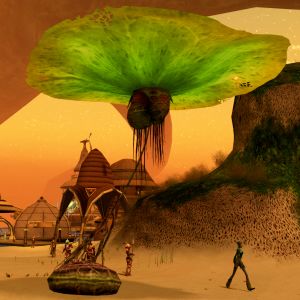From EncyclopAtys
| Taxonomic Amber | |
| A Flyner near Fairhaven | |
|---|---|

| |
| Kingdom | Plants |
| Category | Aerial plant |
| Main Ecosystem(s) | Lakes |
| Counterattack type | None |
The flyner is said to be an “aerial” plant. Indeed, it has the distinctive feature of rising lighter than air, simply held to the ground by an obvious bulbous root. This characteristic allows the plant to keep its most fragile part out of reach of herbivores(15 to 30 feet above ground) who would love to munch on it, hence allowing it the opportunity to become very wide in order to absorb a maximum of light.
The leaf of a young flyner is so light that a single breeze will carry away a piece which has been cut from its root. In fact it is the fruit (hollow cones) beneath the rounded leaf which are the main source of levitation and participate in a clever dissemination technique. They are filled with a very light gas produced by the plant itself.
Flowering occurs in late summer, a single flower appearing above the lobe of the leaf, which can exceed six feet in diameter, on the largest specimens. When mature, the flyners breaks away from its anchor bulb, during days when there is a decent wind, and rises quickly, high into the air. Some Tryker windgineers think that the gas contained in fruit is altered when it reaches a certain height and becomes heavier so that the plant descends into a different location. Once on the ground, the fruit clings and becomes the anchor bulb of a new Flyner which begins the cycle again.
The plant has a bland taste and no significant nourishment but, nevertheless, the Trykers have come up with numerous recipes to prepare it. The bulb is not edible.
Uses
Culinary
Flyner have very little taste and are not nourishing. Cut into strips and seasoned, they can nevertheless accompany other more nourishing dishes. Trykers also enjoy this plant at the table, and they are constantly thinking of new ways to accommodate it. The bulbs are not edible.
Aeronautics
The impression of lightness of this plant gave the Trykers the idea of using it to navigate in the air. In reality, the plant is not light enough to carry a load on its own, but its shape catches the winds that can make it glide over long distances. This very good windward grip has allowed tryker slaves to escape[1] by cutting off the bottom of the stem and clinging to it.
References
Experts
- Botanical specialists: Rosen Ba'Darins, Nili O'Toolyn
- Aeronautical specialist : Winny Mac'Wytter
Sources
- Vrana, Zorai Chronicler, Tria, Nivia 21, 3rd Ca 2559, Private Edition Wa'kwai, Story of an Eventful Evening' and Public Edition of Ryzom
- Derry O'Darren, tryker chronicler, circa 2486 (JY), EncyclopAtys Edition, A Flyner Escape, Chronicle relating an episode in the life of Rosen Ba'Darins
- MVG, the Reporter Fyros with the helmet glued on, (09/11/06 until 19/11), Edition Les Feu d'Atys, Rosen ba'Darins, the Botanist Tryker (out of print)[2].
- Tyllidolh anonymous brought back in the net[3] Lake Botany'.




